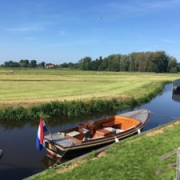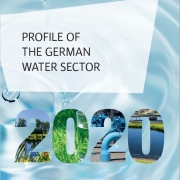On 6 and 7 September, the Netherland’s Union of Water Boards hosted the annual meeting of the European Union of Water Management Associations (EUWMA) in Vinkeveen. The national umbrella organisations for local and regional water management in various European
states share experiences and knowledge with each other.
This year, after the high water last summer, the theme of the meeting was the increasing weather extremes and the importance of climate adaptation measures.
After a delay of 12 months forced by the COVID pandemic, the occasion marked the passing of the EUWMA Presidency from ADA’s Chair, Robert Caudwell, to Hein Pieper, the Vice-President of the Dutch Union of Water Boards. In addition to the Netherlands and UK, delegations from
Belgium, France, Germany and Italy attended, and Spain and Portugal joined the meeting remotely.
Extreme rainfall events
The high water of the Meuse and extreme downpours across Europe this summer left a trail of destruction in many different countries. Crisis coordinator, Aart Los, spoke on behalf of the Dutch Union of Water Boards about the high water in Limburg. Increasing weather extremes,
with extreme torrential rains but also prolonged periods of drought, are putting great pressure on water management in Europe.
Sadly, Germany reported 183 deaths and an estimated return period of event, taking into account climate change, of 0.2% in any one year (1 in 500 years). Without climate change being considered, that return period was closer to 0.04% (1 in 2000 years). Recovery costs will be in excess of €30 billion.
Climate Adaptation
The members of EUWMA decided to join forces to take a stronger position with the Vinkeveen Declaration to put climate adaptation high on the agenda of national Governments and Brussels. “Due to climate change, weather patterns are changing drastically and the global water balance has disappeared,” said Hein Pieper. “The showers become more intensive every year and therefore more often have a devastating effect. Prolonged dry periods follow each other faster and faster. This means that we are forced to give water more space, but also to retain it longer where possible. This can have far-reaching consequences for spatial planning.”
During the year of the Dutch Presidency, EUWMA will also prioritise:
-
- Widening bilateral contacts with a view to expanding EUWMA’s membership. Particular mention was made of seeking discussion with Denmark, Switzerland, Poland and Ireland.
- Improving EUWMA’s digital presence. Updating the EUWMA website and through social media (Twitter: @EUWMA_network).
National priorities
Both Spain and Portugal highlighted escalating energy costs for water irrigation and France reported success with the creation of a system of low-interest public loans for their Associations Syndicales although there remains an issue with loan guarantees. Belgium remains under political pressure to rationalise their multi-tiered system of drainage boards and also the effects of significant pollution of farmland as a result of the summer flooding.
Italy has challenged the reporting levels for River Basin Management Plans, identifying the need to drill down to smaller sub-units as they are finding that the water quality indicators are not suitable for smaller scale water bodies.
Structural Financing
A precondition for good water management is structural financing. That is why Xavier Leflaive of the Organization for Economic Co-operation and Development (OECD) entered into a discussion with the EUWMA members about financing water management.
Climate Adaptation Field Visit
On the second day the group paid a field visit to the Vallei en Veluwe Water Board. Various climate adaptation projects were visited and delegates saw the successful creation of wet meadows from previously cultivated land, discussed the importance of routine river maintenance alongside natural flood management, and visited a farm to understand how the local water board is working with the agricultural sector on water retention and soils management in areas of higher drought risk.
Celebrating 25 Years
The first day ended with a formal dinner to celebrate 25 years of the existence of EUWMA. Members were presented with a commemorative booklet prepared for the occasion by ADA, who were one of the founding members back in 1996.
About EUWMA
The European Union of Water Management Associations (EUWMA) is the European delegation of national umbrella organisations for local and regional water management. The organisation consists of members from ten European states. EUWMA aims to share expertise in the field of water management in Europe. The challenges and solutions surrounding the implementation of European legislation are also important themes within EUWMA.


